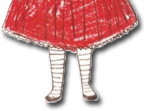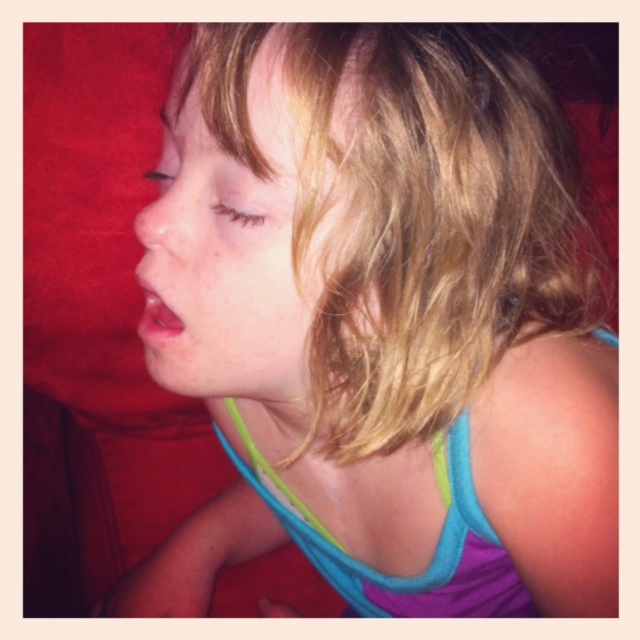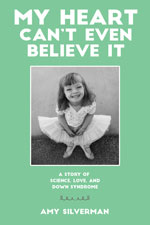
Sleeping Beauty
posted Wednesday October 17th, 2012
Two nights ago, Sophie slept with us. Rather, with me. She leaves Ray alone, but not me. I’m her foot rest, her arm rest, her kicking post. At one point I was sleeping on my side — my back to her — and realized she was using my hip as a pillow.
Typically I’d roll her over, shake her awake, try sending her back to her bed — or at least the other side of my bed. But this time I didn’t say anything, just tried to go back to sleep despite the bowling ball resting on my butt.
I’ve had more sympathy for Sophie since our trip to Tucson last week. Mostly it was for fun — we visited friends, shopped, played games. But I did have one “grown up” appointment at the University of Arizona, where, it turns out, some important Down syndrome research is happening.
Who knew? I usually pride myself on knowing what’s going on in my backyard, but I didn’t realize that in the last few years, UA has become an important hub for DS research. Professor Jamie Edgin was kind enough to give me a tour — just a few rooms in the basement of a space science building, nothing special looking. But the conversation was pretty awesome.
I’ll boil it way down: Edgin, whose background is in psychology, is interested in the physical characteristics of Down syndrome that exacerbate cognitive deficiencies. I’m sure I’m botching that, but I think she’d agree that’s the basic idea. Right now she’s very interested in sleep. Turns out, people with Down syndrome have a double whammy that makes them prone to sleep apnea: a certain cranial structure along with low muscle tone.
Edgin’s research shows that sleep apnea in children with Down syndrome has an impact on cognitive abilities. (A pretty profound one.)
“Oh, I’m sure Sophie has sleep apnea,” I told her — thinking about how Sophie wanders each night from her bed to the couch to my bed, trying to get comfortable; how she snores and starts awake; how she prefers to sleep sitting up (see photo — taken after she fell asleep during the first presidential debate).
Edgin explained that one thing her research shows is that the subjects with sleep apnea have lower vocabularies, because we “consolidate” our memories at night. That makes sense, I told her, but Sophie seems to have a pretty good internal dictionary.
These kids also have problems with transitions, she said.
“DING DING DING! That’s Sophie!” I thought, cataloging the last dozen or so instances — which had taken place just that day.
Okay, I said, sign us up. And so the researchers will come to our house later this fall. (I better straighten up the bedrooms!)
There’s no guarantee any of it will make a difference — or that, if Sophie is diagnosed with sleep apnea, that she’ll wear the mask most of the middle-aged men I know are wearing. But it’s worth a try. And it’s fascinating.
I’ve long wondered if the physical differences in people with DS affect their mental abilities. When Sophie was a few months old, they put her in a Doc Band — one of those white football helmet-looking contraptions meant to round out a flat-backed head. Mostly typical kids wear them; the helmets were a huge and important find, considering before them, quack doctors were performing risky cranial surgery on babies to fix heads made flat by back sleep. (The unintended consequence of the fix for Sudden Infant Death Syndrome.)
Sophie was weak as a baby — in need of heart surgery, unable to suck hard enough to eat without a tube — and her head quickly emerged as a candidate for a band. So we did it, and in reading the research I noticed that some were saying that without a Doc Band, there was a risk of developmental disabilities.
I asked the Doc Band folks if there was a chance Sophie could have improved cognitive abilities because her head would be “fixed” — I thought about the people I’d seen with Down syndrome, and in fact, they all seemed to have flat heads.
Maybe a Doc Band for every child with DS could improve cognitive function?
The woman fitting Sophie’s Doc Band just looked at me funny, and changed the subject. I dropped it, figuring it was just a silly notion, a too-hopeful idea on my part. Most likely, the whole thing really is cosmetic. (And for the record, that band didn’t do a damn thing to her head — maybe Down syndrome made the flatness a foregone conclusion, or maybe it was the fact that the thing rubbed a hot spot on my poor baby’s head, so she couldn’t wear it the required 23 hours a day.)
At that point, I was looking for — well, if not a cure, then at least some hope. Almost 10 years later, I’m cool with Sophie. She’s pretty damn smart, if you ask me. Yes, I’d love it if her IQ shot up a few points with a sleep mask, but I’m not holding my (own sleep-deprived) breath. I’ll be thrilled if she gets a little easier on the transition front. And if not, I can live with that, too.
But on a meta-level, I’m delighted that Professor Edgin thinks the way she does — and that she’s only a two-hour drive away from me, walking the walk.
If you want more information on the University of Arizona Down syndrome Research Group, here it is.








I know how I get without enough sleep – functioning like that for 10+ years has got to take it’s toll. We had a sleep study done earlier this year as a pro forma thing but it was actually pretty bad – ended up getting her adenoids out (along w/some other stuff), which had the huge bonus of clearing up her nose (adenoids are apparently like little petri dishes. who knew?).
Does Sophie still have her tonsils/adenoids? I think that’s the usual first stop before the c-pap.
[Does the T/A abbreviation make you giggle too, or am I the only juvenile here? ]
Very interesting. There are some things that apply to my son here. We didn’t do the doc band and I regret it. He also has low muscle tone and I’ve been concerned about his sleep. While he also doesn’t have vocab deficits, his aspie characteristics are higher when he has a bad night’s sleep. And he snores. A lot. This info is going to finally get me to talk with his doctor about it. Thanks!
oh yes, the abbreviations make me giggle! sophie does still have her tonsils/adenoids — we haven’t had any of the other problems associated with those, so it hasn’t come up as an issue…. but maybe it should. sigh. good to know it helped you guys!
Jennifer — We’ll have to compare notes in a couple months!
I also just heard a bit on npr about lack of sleep & weight. Originally thought they were talking about me, but I wonder if that contributes to the pounds in adults with Ds?
The T&A was also a total game-changer for us. Health and sleep both improved dramatically.
Please keep us posted. The new AAP guidelines for children with Ds recommend a sleep study for all kids before age 4. We declined since we’d already done the surgery and seen such improvement, but I do wonder sometimes if we should do it anyway…
So I am here because I am procrastinating on putting together materials for a meeting about an advocacy program for my own group of people with a disability- narcolepsy. And I just finished doing a handout on the medical and intellectual consequences of disrupted nighttime sleep, which people with narcolepsy (PWNs) and folks with sleep apnea both have.
A quick run down:
Increased risk of heart problems and related health issues
Decreased concentration and focus
Higher risk of obesity and diabetes
Impaired memory and problem solving ability
Higher risk of high blood pressure and stroke
Impaired growth (this one gets an asterisk- connection is a little more tenuous, but growth hormones are released during slow wave sleep, so when you get less of it…)
Impaired judgement
Higher mortality
Clumsiness
Of course, all these things apply to me as well as to anyone else with a sleep disorder. I know this is a very old post, but if anyone sees this comment- PLEASE consider getting anyone you know with apnea or another sleep disorder to talk to a doctor about their quality of sleep. It doesn’t have to mean a clunky CPAP. Sometimes something as simple as having your tonsils removed or getting a special pillow can improve matters significantly. Also, the CPAPs out there today are much less cumbersome than they used to be. It can make a huge difference.